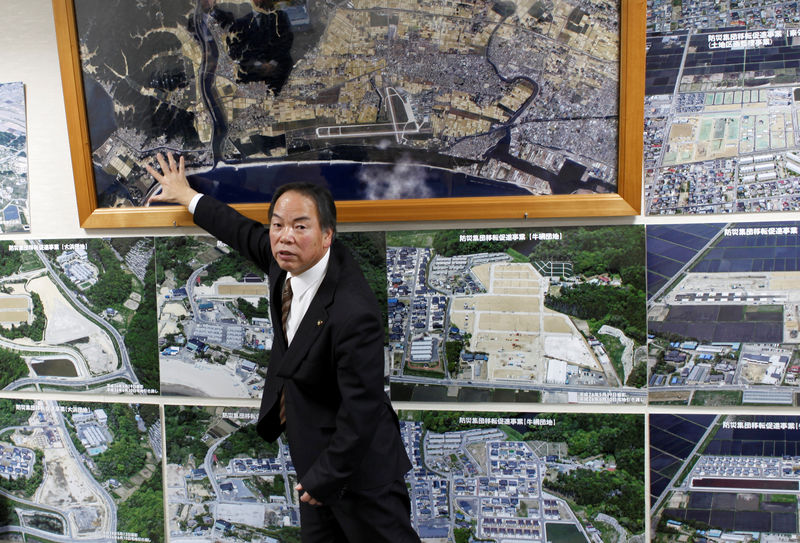By Aaron Sheldrick and Osamu Tsukimori
TOKYO/HIGASHI MATSUSHIMA, JAPAN (Reuters) - A northern Japanese city's efforts to rebuild its electric power system after the 2011 earthquake and tsunami mark a quiet shift away from the country's old utility model toward self-reliant, local generation and transmission.
After losing three-quarters of its homes and 1,100 people in the March 2011 temblor and tsunami, the city of Higashi Matsushima turned to the Japanese government's "National Resilience Program," with 3.72 trillion yen ($33.32 billion) in funding for this fiscal year, to rebuild.
The city of 40,000 chose to construct micro-grids and de-centralized renewable power generation to create a self-sustaining system capable of producing an average of 25 percent of its electricity without the need of the region's local power utility.
The city's steps illustrate a massive yet little known effort to take dozens of Japan's towns and communities off the power grid and make them partly self-sufficient in generating electricity.
"At the time of the Great East Japan earthquake, we couldn't secure power and had to go through incredible hardships," said Yusuke Atsumi, a manager at HOPE, the utility Higashi Matsushima created to manage the local generation and grid.
Under a large-scale power system a "blackout at one area would lead to wide-scale power outages. But the independent distributed micro-grid can sustain power even if the surrounding area is having a blackout."
The Resilience Program is mainly for building back-up capabilities for Japan's cities and towns in the event of another disaster such as the earthquake and tsunami that caused meltdowns at the Fukushima nuclear power plant.
However, the Program has spurred the creation of micro-grids and distributed power generation across Japan that reduces municipalities dependence on large power plants.
Japan's government ministries are seeking to raise the budget for the Program by another 24 percent for the fiscal year starting in April 2018, the cabinet office said last month.
The money earmarked for this fiscal year is going in part to the creation of smart energy management systems and distributed generation systems in towns across Japan.
"Since Fukushima, there has been a gradual elaboration of policies to realize that kind of local autonomy, local consumption paradigm," said Andrew Dewit, a professor of energy policy at Rikkyo University in Tokyo.
Distributed generation uses small-scale power generation fueled by natural gas or solar and wind power arrays. Smart energy systems use the internet to connect appliances and meters to better direct electric power where and when its needed.
Higashi Matsushima has built its own independent transmission grid and solar generating panels as well as batteries to store power that can keep the city running for at least three days, according to Atsumi.
Companies in Japan are shifting their focus in response to the changes heralded by cities like Higashi Matsushima.
Sekisui House (T:1928), Japan's biggest builder of detached homes, constructed Higashi Matsushima's smart micro-grid for 85 housing units in 2016.
Taisei Corp (T:1801), one of Japan's biggest construction companies, set up an energy strategy division this year to take advantage of the drive for smart energy systems.
The company is planning to double energy-related orders to around 120 billion yen over the next five years, focusing on renewables, energy efficient buildings and smart communities, a spokesman said.
Steps taken by cities like Higashi Matsushima were the brainchild of Takao Kashiwagi, a professor at the International Research Centre for Advanced Energy Systems for Sustainability at the Tokyo Institute of Technology.
He designed Japan's first smart town and is the head of the New Energy Promotion Council that has paid out more than 100 billion yen in subsidies from the Ministry of Economy, Trade and Industry for smart energy communities.
"We are moving towards a day when we won't be building large-scale power plants. Instead, we will have distributed power systems, where small power supply systems are in place near the consumption areas," he said.
For a graphic on Japan's energy mix, click: http://reut.rs/2f6XOIT
